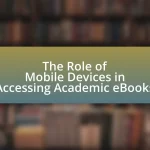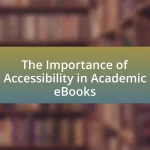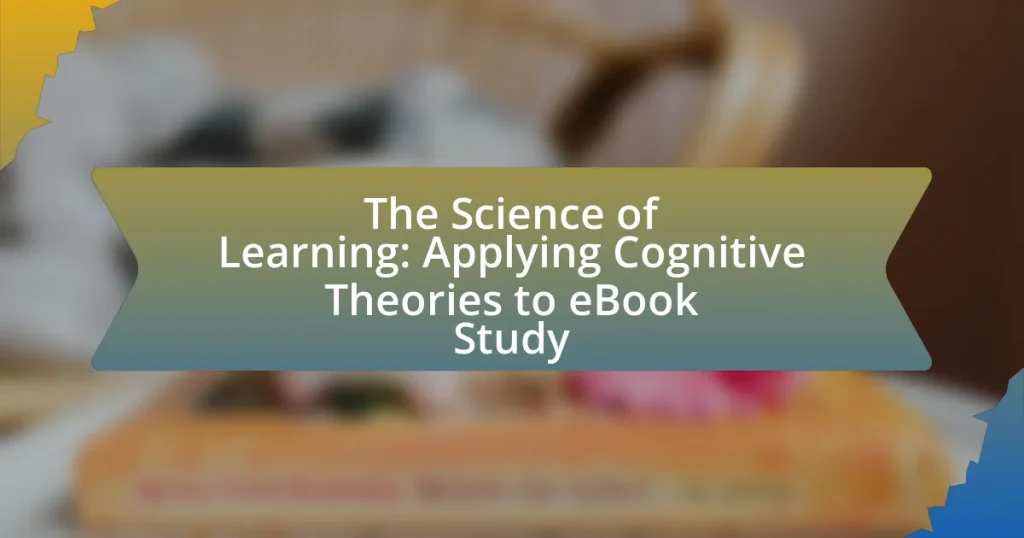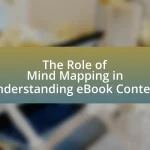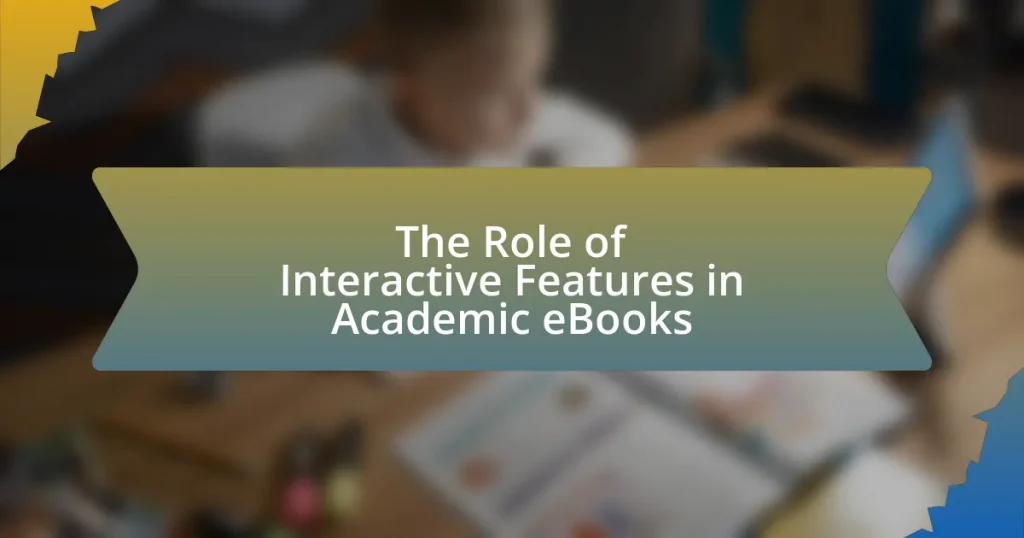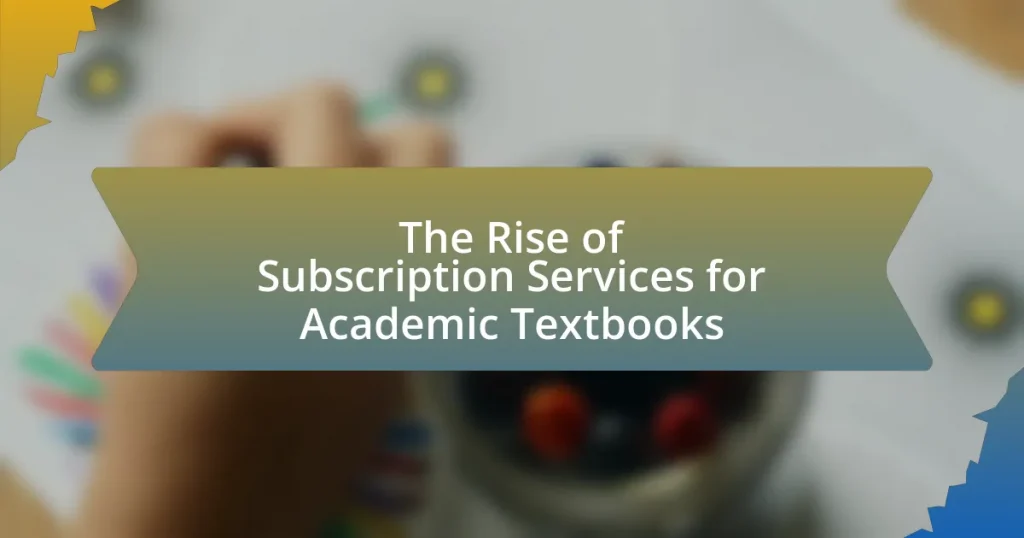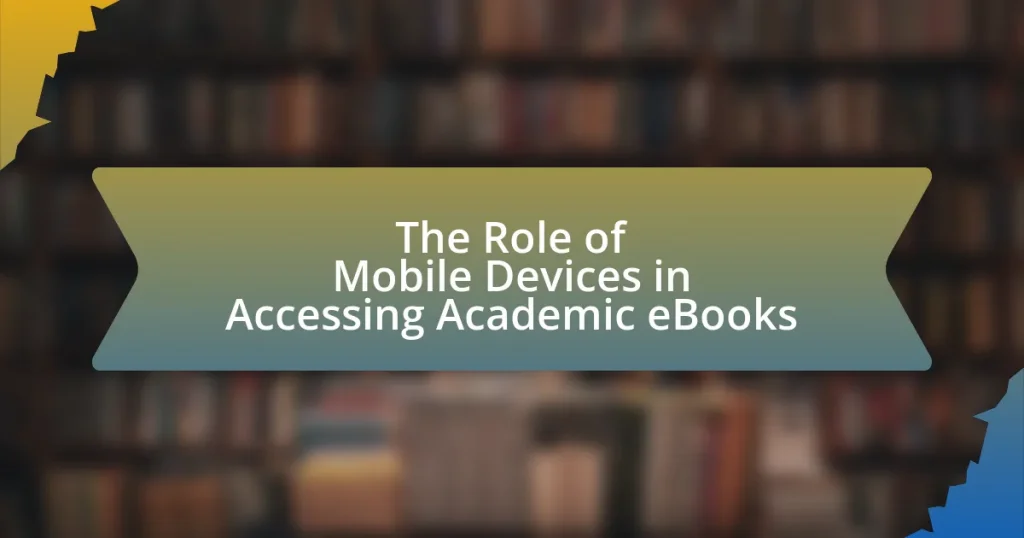The article focuses on “The Science of Learning,” an interdisciplinary field that explores how individuals acquire, retain, and apply knowledge through cognitive processes. It examines the influence of cognitive theories, such as Piaget’s and Vygotsky’s, on learning strategies and their application to eBook study. Key topics include effective learning techniques like spaced repetition and active engagement, the role of multimedia in enhancing comprehension, and the challenges faced in digital learning environments. The article emphasizes the importance of understanding cognitive principles to optimize educational practices and improve learning outcomes in eBook formats.
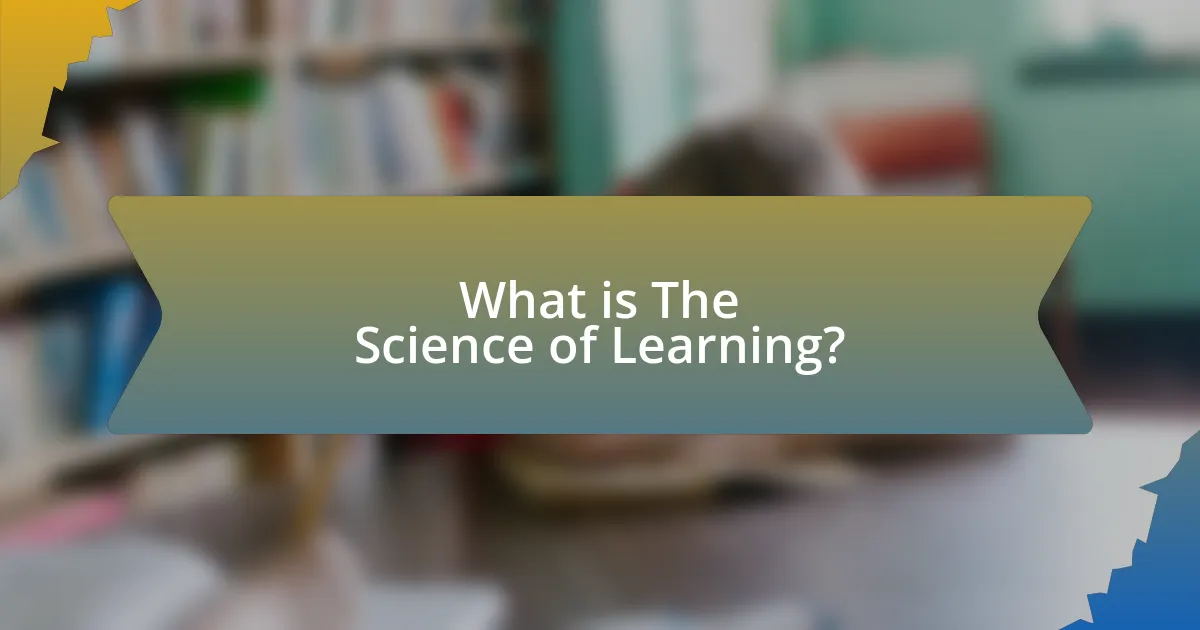
What is The Science of Learning?
The Science of Learning is an interdisciplinary field that examines how people acquire, retain, and apply knowledge. It integrates insights from psychology, neuroscience, and education to understand the cognitive processes involved in learning. Research indicates that effective learning strategies, such as spaced repetition and active engagement, enhance retention and understanding, as demonstrated by studies like those conducted by Dunlosky et al. (2013) in “Improving Students’ Learning with Effective Learning Techniques,” published in Psychological Science in the Public Interest. This body of work underscores the importance of applying cognitive theories to optimize educational practices, particularly in contexts like eBook study, where digital tools can facilitate these learning strategies.
How do cognitive theories influence learning processes?
Cognitive theories influence learning processes by emphasizing the role of mental processes in understanding how individuals acquire, process, and retain knowledge. These theories, such as Piaget’s theory of cognitive development and Vygotsky’s social constructivism, highlight the importance of internal cognitive structures and social interactions in learning. For instance, Piaget’s stages of cognitive development illustrate how learners progress through different levels of understanding, which informs educators on how to tailor instruction to match learners’ cognitive abilities. Additionally, Vygotsky’s concept of the Zone of Proximal Development underscores the significance of social interaction and scaffolding in facilitating learning, demonstrating that learners achieve higher levels of understanding through collaboration and guidance. These frameworks provide a basis for developing effective educational strategies that align with learners’ cognitive processes, ultimately enhancing the learning experience.
What are the key cognitive theories relevant to learning?
The key cognitive theories relevant to learning include Piaget’s Theory of Cognitive Development, Vygotsky’s Social Development Theory, and Bandura’s Social Learning Theory. Piaget’s theory emphasizes the stages of cognitive development, suggesting that learners construct knowledge through experiences and interactions with their environment. Vygotsky’s theory highlights the importance of social interaction and cultural context in cognitive development, introducing concepts like the Zone of Proximal Development, which illustrates how learners can achieve higher levels of understanding with guidance. Bandura’s theory focuses on observational learning, positing that individuals learn behaviors and information by observing others, which underscores the role of modeling in the learning process. These theories collectively provide a framework for understanding how cognitive processes influence learning outcomes.
How do these theories apply to different learning styles?
Cognitive theories apply to different learning styles by providing frameworks that cater to individual preferences in processing information. For instance, Howard Gardner’s Theory of Multiple Intelligences identifies various learning styles, such as linguistic, logical-mathematical, and spatial, which can be supported by cognitive strategies like mnemonic devices for linguistic learners or visual aids for spatial learners. Research by Dunn and Dunn emphasizes the importance of tailoring educational approaches to accommodate these diverse styles, demonstrating that students perform better when instruction aligns with their preferred learning methods. This alignment enhances engagement and retention, validating the effectiveness of applying cognitive theories to address different learning styles.
Why is understanding learning science important for eBook study?
Understanding learning science is crucial for eBook study because it informs the design and delivery of educational content, enhancing learner engagement and retention. Research indicates that applying principles from cognitive psychology, such as spaced repetition and active learning, can significantly improve comprehension and memory retention in digital formats. For instance, a study by Roediger and Butler (2011) published in “Psychological Science” demonstrates that retrieval practice enhances long-term retention, which can be effectively integrated into eBook features. Thus, leveraging learning science principles in eBook design leads to more effective learning experiences.
How can cognitive theories enhance eBook learning experiences?
Cognitive theories enhance eBook learning experiences by providing frameworks that improve information retention and understanding. For instance, theories such as cognitive load theory suggest that eBooks can be designed to minimize extraneous cognitive load, allowing learners to focus on essential information. Research indicates that when eBooks incorporate interactive elements, such as quizzes and multimedia, they align with cognitive theories that emphasize active learning, leading to better engagement and comprehension. A study by Mayer (2009) in “Learning and Instruction” supports this, showing that multimedia learning environments can significantly enhance learning outcomes by facilitating deeper cognitive processing.
What role does motivation play in the science of learning?
Motivation is a critical factor in the science of learning as it directly influences engagement, persistence, and the overall effectiveness of the learning process. Research indicates that motivated learners are more likely to set goals, employ effective learning strategies, and achieve higher academic performance. For instance, a study by Deci and Ryan (2000) highlights that intrinsic motivation, which arises from personal interest and enjoyment in the task, leads to deeper learning and better retention of information. Additionally, motivation affects cognitive processes such as attention and memory, which are essential for successful learning outcomes.
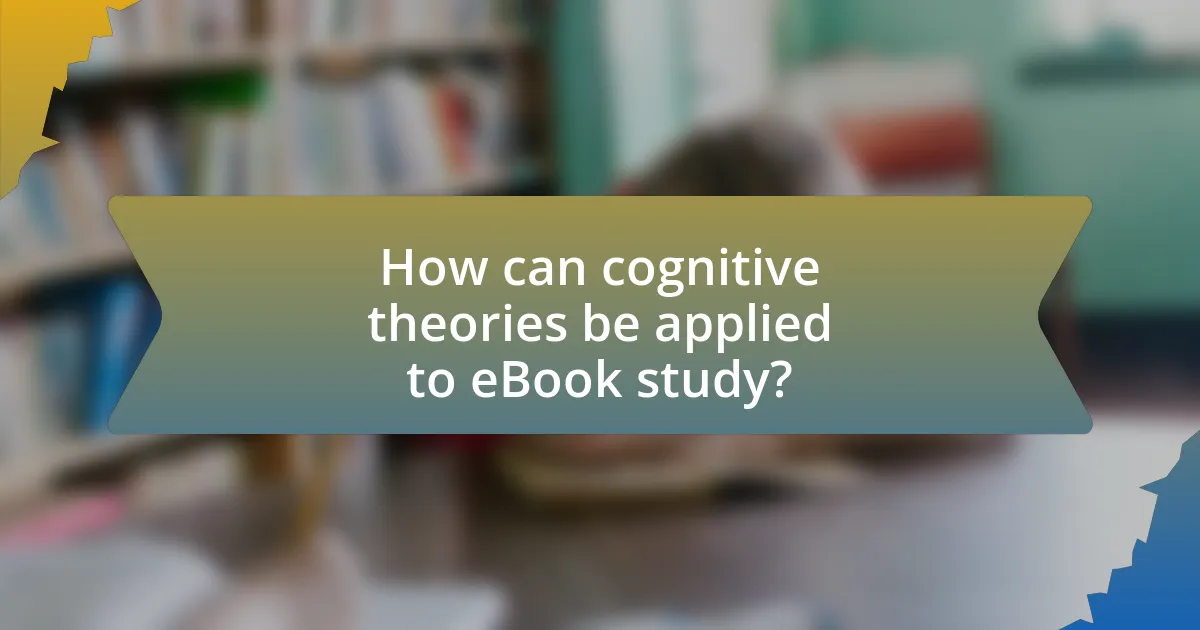
How can cognitive theories be applied to eBook study?
Cognitive theories can be applied to eBook study by utilizing principles such as active engagement, spaced repetition, and multimedia learning. Active engagement enhances comprehension and retention by encouraging readers to interact with the content through annotations and quizzes. Spaced repetition, supported by cognitive load theory, suggests that revisiting material over time improves long-term memory retention. Multimedia learning theory indicates that combining text with visuals can facilitate better understanding and recall. Research by Mayer (2009) in “Multimedia Learning” demonstrates that learners achieve higher retention rates when information is presented in both verbal and visual formats, validating the effectiveness of these cognitive strategies in eBook study.
What strategies can be derived from cognitive theories for effective eBook study?
Cognitive theories suggest several strategies for effective eBook study, including active engagement, spaced repetition, and the use of multimedia elements. Active engagement, such as summarizing content or asking questions while reading, enhances comprehension and retention by promoting deeper processing of information. Spaced repetition, which involves reviewing material at increasing intervals, leverages the spacing effect to improve long-term memory retention. Additionally, incorporating multimedia elements, such as videos or interactive quizzes, caters to different learning styles and can enhance understanding by providing varied contexts for the information. These strategies are supported by research indicating that active learning and spaced practice significantly improve educational outcomes.
How can spaced repetition improve retention in eBook learning?
Spaced repetition enhances retention in eBook learning by systematically increasing the intervals between reviews of material, which aligns with the brain’s natural learning processes. This method leverages the spacing effect, a psychological phenomenon where information is more easily recalled when it is studied over spaced intervals rather than in a single session. Research indicates that spaced repetition can improve long-term retention by up to 50% compared to traditional study methods, as shown in studies like Cepeda et al. (2006) published in “Psychological Science.” This approach allows learners to reinforce their memory at optimal times, reducing cognitive overload and enhancing the encoding of information into long-term memory.
What techniques can enhance comprehension while studying eBooks?
Active reading techniques, such as annotating, summarizing, and questioning, can significantly enhance comprehension while studying eBooks. Annotating involves highlighting key points and making notes in the margins, which helps reinforce understanding and retention of information. Summarizing sections after reading them allows learners to consolidate their knowledge and identify main ideas. Questioning, or self-testing, encourages critical thinking and deeper engagement with the material. Research indicates that these strategies align with cognitive theories of learning, which emphasize active participation in the learning process as a means to improve comprehension and retention. For instance, a study by Dunlosky et al. (2013) in “Psychological Science in the Public Interest” highlights that self-testing and elaborative interrogation are effective methods for enhancing learning outcomes.
How do multimedia elements in eBooks support cognitive learning?
Multimedia elements in eBooks support cognitive learning by enhancing engagement and facilitating deeper understanding through various sensory modalities. Research indicates that incorporating visuals, audio, and interactive components can improve information retention and comprehension. For instance, a study by Mayer (2009) in “The Cambridge Handbook of Multimedia Learning” demonstrates that learners who engage with multimedia content perform better on retention tests compared to those who use text-only formats. This is attributed to the dual coding theory, which posits that information processed through both verbal and visual channels leads to more effective learning outcomes.
What types of multimedia are most effective for learning?
Visual and interactive multimedia are the most effective for learning. Research indicates that incorporating visuals, such as diagrams and videos, enhances comprehension and retention by engaging multiple cognitive processes. A study by Mayer (2009) found that students who learned with multimedia that combined text and visuals performed better on tests than those who learned with text alone. Additionally, interactive elements, such as quizzes and simulations, promote active learning, which has been shown to improve understanding and application of knowledge (Prince, 2004).
How can visual aids improve understanding of complex concepts?
Visual aids enhance understanding of complex concepts by providing visual representations that simplify information processing. Research indicates that the dual coding theory, proposed by Allan Paivio, suggests that people process verbal and visual information differently, allowing for better retention and comprehension when both modalities are used. For instance, a study published in the journal “Educational Psychology” by Mayer and Moreno (2003) demonstrated that students who learned with both text and corresponding diagrams performed better on tests than those who learned with text alone. This evidence supports the effectiveness of visual aids in facilitating cognitive understanding and retention of intricate ideas.
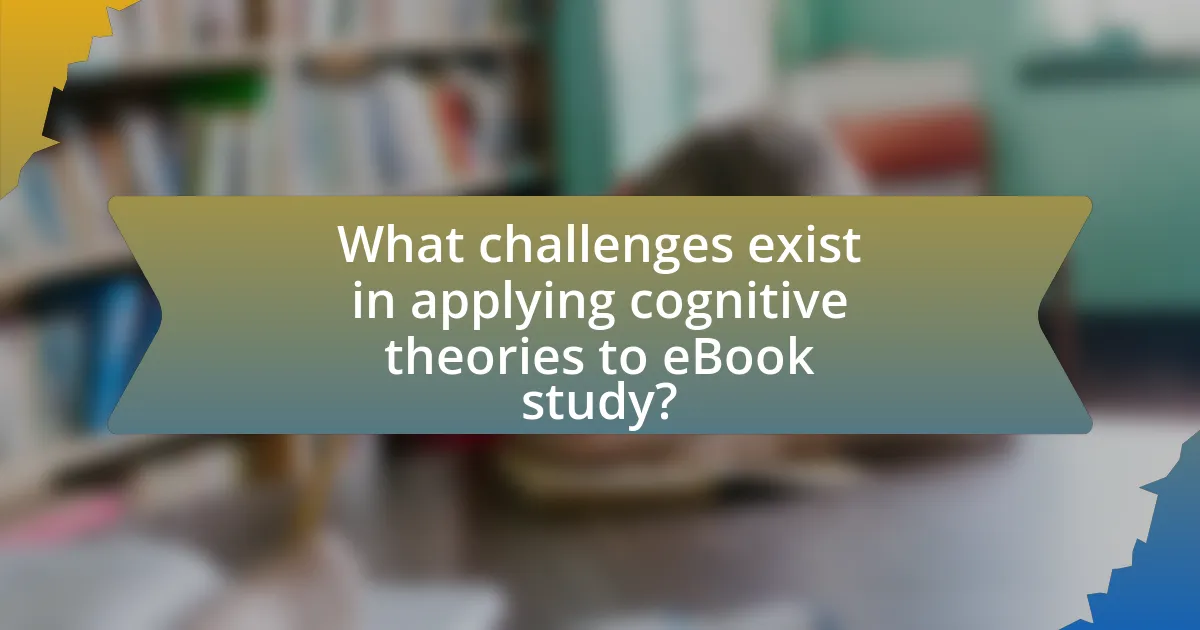
What challenges exist in applying cognitive theories to eBook study?
Applying cognitive theories to eBook study faces several challenges, primarily due to the differences in how digital formats affect learning processes compared to traditional print media. One significant challenge is the potential for cognitive overload; eBooks often contain multimedia elements that can distract learners and hinder information retention. Research indicates that excessive multimedia can overwhelm working memory, leading to decreased comprehension (Mayer, 2009).
Another challenge is the variability in user engagement; eBooks may not provide the same tactile feedback and focus that physical books do, which can impact motivation and attention. Studies show that the physicality of print can enhance memory recall and engagement (Mangen et al., 2013).
Additionally, the lack of standardized navigation and interaction features in eBooks can lead to inconsistent learning experiences, making it difficult to apply cognitive theories effectively. This inconsistency can disrupt the application of established cognitive principles, such as spaced repetition and retrieval practice, which are crucial for effective learning.
Overall, these challenges highlight the need for careful consideration of cognitive principles when designing eBook content to optimize learning outcomes.
What common obstacles do learners face when using eBooks?
Learners commonly face obstacles such as distractions, navigation difficulties, and comprehension issues when using eBooks. Distractions arise from the digital environment, where notifications and multitasking can interrupt focus. Navigation difficulties occur due to non-linear formats and complex interfaces, making it hard for learners to find specific information quickly. Comprehension issues can stem from the lack of tactile engagement and the overwhelming amount of information presented on screens, which can hinder retention and understanding. Research indicates that these factors significantly impact learning outcomes, as highlighted in studies on digital reading versus traditional print reading.
How can distractions impact the effectiveness of eBook study?
Distractions significantly reduce the effectiveness of eBook study by impairing focus and retention of information. When learners are distracted, their cognitive resources are divided, leading to decreased comprehension and memory consolidation. Research indicates that multitasking, often a result of distractions, can lower academic performance by up to 40% (Rosen, et al., 2013, “The Impact of Technology on the Learning Process,” Computers in Human Behavior). This diminished effectiveness occurs because distractions interrupt the learning process, making it harder for individuals to engage deeply with the material and retain key concepts.
What strategies can mitigate these challenges?
To mitigate challenges in eBook study, implementing active learning strategies is essential. Active learning techniques, such as summarization, self-explanation, and retrieval practice, enhance comprehension and retention of information. Research by Roediger and Butler (2011) demonstrates that retrieval practice significantly improves long-term memory retention compared to passive review methods. Additionally, incorporating spaced repetition can further reinforce learning by allowing learners to revisit material at strategically timed intervals, as supported by Ebbinghaus’s forgetting curve. These strategies collectively address cognitive overload and enhance engagement, leading to more effective eBook study outcomes.
How can learners assess their understanding when using eBooks?
Learners can assess their understanding when using eBooks by utilizing built-in features such as quizzes, highlighting key concepts, and taking notes. These interactive elements allow learners to engage with the material actively, reinforcing comprehension. For instance, studies show that self-testing through quizzes can enhance retention and understanding, as evidenced by research from Roediger and Butler (2011) in “The Critical Role of Retrieval Practice in Long-Term Retention.” Additionally, highlighting and annotating text helps learners identify important information, facilitating better recall and deeper processing of the content.
What self-assessment techniques are effective for eBook study?
Effective self-assessment techniques for eBook study include self-quizzing, summarization, and reflective journaling. Self-quizzing enhances retention by prompting learners to recall information actively, which has been shown to improve long-term memory retention (Roediger & Butler, 2011). Summarization allows learners to distill key concepts, reinforcing understanding and aiding in the organization of information. Reflective journaling encourages learners to articulate their thoughts and insights, fostering deeper engagement with the material. These techniques align with cognitive theories that emphasize active learning and metacognition, supporting effective study practices in eBook formats.
How can feedback mechanisms enhance the learning process?
Feedback mechanisms enhance the learning process by providing learners with timely and specific information about their performance, which facilitates self-assessment and improvement. Research indicates that feedback can significantly increase retention and understanding; for instance, a study by Hattie and Timperley (2007) found that feedback can lead to an effect size of 0.79, indicating a substantial impact on learning outcomes. This process allows learners to identify gaps in their knowledge, adjust their strategies, and reinforce correct understanding, ultimately leading to deeper learning and mastery of the material.
What are best practices for maximizing eBook study effectiveness?
To maximize eBook study effectiveness, readers should employ active reading strategies, such as summarizing content, asking questions, and making connections to prior knowledge. Research indicates that active engagement with material enhances retention and understanding, as demonstrated in studies like “The Effect of Active Learning on Student Outcomes” by Freeman et al. (2014), which found that students in active learning environments performed significantly better than those in traditional lectures. Additionally, utilizing features like highlighting, note-taking, and interactive quizzes within eBooks can further reinforce learning by promoting self-testing and spaced repetition, both of which are proven techniques for improving memory retention.
How can learners create an optimal study environment for eBooks?
Learners can create an optimal study environment for eBooks by ensuring a distraction-free space, utilizing appropriate lighting, and maintaining a comfortable seating arrangement. A distraction-free environment minimizes interruptions, which is crucial for maintaining focus and enhancing retention of information. Research indicates that environments with fewer distractions can improve cognitive performance by up to 50%. Proper lighting reduces eye strain and fatigue, allowing learners to engage with eBooks for extended periods without discomfort. Additionally, ergonomic seating supports physical comfort, which is essential for prolonged study sessions. These factors collectively contribute to an effective learning atmosphere that enhances comprehension and retention of eBook content.
What tips can help maintain focus and motivation during eBook study?
To maintain focus and motivation during eBook study, establish a structured study environment and set specific goals. A dedicated study space minimizes distractions, while clear, achievable objectives enhance motivation by providing a sense of direction. Research indicates that goal-setting can significantly improve performance and persistence in learning tasks (Locke & Latham, 2002). Additionally, incorporating regular breaks using techniques like the Pomodoro Technique can sustain attention and prevent burnout, as studies show that short breaks can enhance overall productivity and focus (Fritz et al., 2011).


